By the standards of The Bishops Avenue, one of the wealthiest enclaves in the world, Vipram House is nothing to write home about. While some of the north London street’s properties can change hands for dozens of millions of pounds, two years ago Vipram House sold for just £10m.
A 2013 estate agent’s brochure for what was then called Carlton House encouraged potential buyers to look past an unimpressive exterior. “The understated architecture of the frontage gives little indication of the luxury and opulence that lies within,” it said, “including 7 bedrooms all with lavish marble en-suite bathrooms, an indoor leisure and swimming pool complex and even an indulgent 10-person Turkish bath.”
Less attention was lavished on the circumstances of the sale. Carlton House had been seized in connection with a massive international fraud case, involving billions of dollars allegedly looted from a Kazakh bank. Hundreds of companies, many offshore, had their assets frozen in an attempt to recover the funds. Eight years and dozens of court cases later, the bank is still pursuing its own ex-chairman for the billions it alleges he stole.
Now, one of the myriad legal disputes to result from the Kazakh bank case has shed new light on a little-known immigration scheme used by the family at the centre of the scandal.
Madiyar Ablyazov was born in Kazakhstan in 1992, to Alma Shalabayeva and her husband Mukhtar Ablyazov. He lived there until the age of 10, then relocated to London and the luxury of Carlton House, where he lived with his aunt and uncle while studying at private schools, including Northbridge House and Highgate.
In 2008, as he approached the end of his studies, his family began contemplating alternatives that would allow him to remain in the country. Their eventual solution was an immigration scheme known as a “golden visa”. Officially called a “Tier 1 investor” visa in the UK, the scheme gives individuals residency in exchange for investing £2m in UK bonds or shares through a bank, with applicants eligible for indefinite leave to remain, and even full citizenship, after five years. That is, unless they can stump up more cash: those offering £5m can settle after three years, and those with £10m after just two.
Because the original investment is returned to the applicant along with any interest accrued, the state technically makes a loss on each visa. But supporters of the scheme argue that as well as an investment in gilts – effectively a loan to the government – the country attracts people with substantial sums of money to spend on goods, hire workers or pay taxes.
Plenty of other countries, Malta, Cyprus and Portugal among them, offer rival schemes, with varying terms. The US’s EB-5 pathway, for instance, exchanges passports for a $1m investment in any business that will create at least 10 jobs (the former company of Jared Kushner was recently found hawking these visas in China). But all are fundamentally offering the same trade: show us the money, and in return receive residency, citizenship or passports.
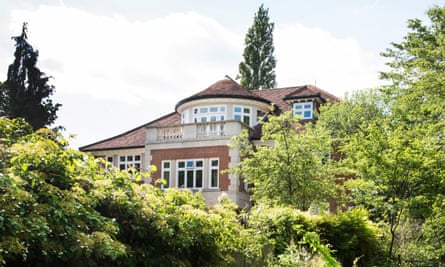
What sort of people buy a golden visa? “The common trait is they’re very successful business people,” says John Hanafin, chief executive officer of Arton Capital, which specialises in what is known in the trade as “investment migration”. Many of his clients, often from the Middle East or Africa, want the mobility that a second passport entails, with those granting EU access especially highly prized.
“[They] can’t go to a meeting in Paris on a Monday because they’ve got to apply for a Schengen visa and they need three to four weeks’ notice,” he says. “They might be heads of industry in these countries. They might even have their own airplane. Their airplane can fly into these countries and have licences to land, but they can’t.”
For others, alternative citizenship can offer a bolthole in times of trouble. “It’s a bit of a barometer of strife and turmoil in the world,” says Paul Williams of La Vida Golden Visas, whose firm used to focus on those looking to invest in overseas property. “They’re looking to the future more for security, whether that be in investment of their assets, or in physical security. If something goes wrong at home, they’ve got somewhere to go and live.”
Right now, he says, Portugal offers the best deal. “Half a million euros investment in real estate … gets you residency, but most people don’t live there. Most people use it to invest, rent the property out, but they’ve got it as a sort of security policy.”
Williams’ first golden visa client arrived four years ago, looking to move to Portugal. “It was a fairly high-ranking former politician from a smallish country, but we didn’t know who he was,” he says. “We realised afterwards, once he was investing quite a bit of money. We looked him up and kind of went, ‘Right, our game has changed. We’re no longer selling real estate in Europe to people looking for second homes.”
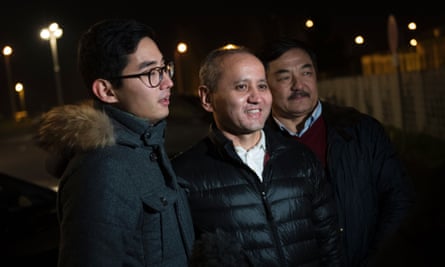
For some, it may come as a surprise to learn that residence or citizenship can effectively be bought. But the idea has been around for some time, first being pioneered by the tiny twin islands of St Kitts and Nevis in 1984.
In 1994 then-home secretary Michael Howard faced a minor political scandal after a leaked white paper on improving the UK’s “competitiveness” included a provision for ‘immigrant investors’. Labour slammed the scheme as a plot to allow wealthy Tory donors to “jump the queue” into the UK. But after that brief outrage the scheme receded from public view, and has never played any major role in the country’s years of bitter discourse about foreigners or immigrants.
The steadily rising cost of immigration bureaucracy has already helped to effectively exclude immigrants without resources; the cost of submitting an indefinite leave to remain application rose 18% to £2,297 earlier this year. But beyond this, the system has tended to assume that the more money an applicant has, the better an immigrant they will be, without ever quite explaining why. The Highly Skilled Migrant Programme, a points-based system introduced under Labour in 2002, awarded more points for those with higher earnings. Golden visas simply take this principle to its logical extreme: the only merit an immigrant need demonstrate is their wealth.
Critics worry that such schemes have commodified national identity, for questionable or no gain. “This is an area where successive governments have allowed rich people to jump the queue. It’s the sort of thing that tax havens do to encourage inward investment,” says Lord Wallace of Saltaire, a Liberal Democrat member of the House of Lords. “We have in effect been selling off British citizenship to the rich from often non-democratic countries who otherwise one would not regard as desirable immigrants.”
More darkly, others allege the schemes are effectively conduits for stolen money. “The problem with these kind of schemes, and the one in the UK in particular, is that it’s letting people in without sufficient security checks,” says Naomi Hirst, a senior campaigner at the anti-corruption group Global Witness. “We’ve long had concerns that applicants who came through in the blind faith period were not subject to proper security checks.”
The phrase “blind faith period” is used by anti-corruption campaigners to refer to 2008 to 2015, when checks on applicants and their wealth were the responsibility of neither the British government nor applicants’ banks. “The Home Office assumed that the banks were doing the checks on the individuals, and the banks themselves were assuming that, because this individual was applying for a visa via the Home Office, the checks would be done further down the line,” says Hirst.
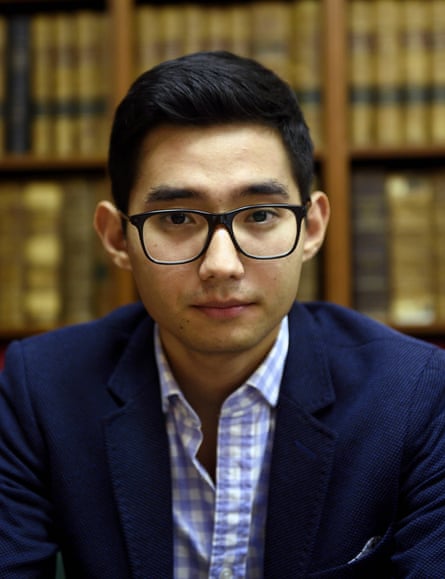
“About 3,000 individuals came through in that period. We are completely in the dark about the extent to which the UK government actually knew who these people were and where their money was coming from.”
Attempts to prove this either way by journalists or campaigners always hit the same stumbling block: applicants’ names are secret. Until last year, that is, when one of the dozens of Ablyazov fraud cases reached the high court.
In January 2008 – right at the beginning of the blind faith period – the Ablyazovs began applying for Madiyar’s Tier 1 investor visa. Solicitors were hired, Swiss bank accounts were opened, and funds of just over £1m were put into Madiyar’s name (the investment threshold was raised to £2m in 2015). As part of the process, the family provided the UK Border Agency with a “memorandum of gift”. The document, which bore the signatures of both father and son, stated: “[Madiyar] has been gifted £1m sterling. [Madiyar] is the recipient of the gift,” and identified Mukhtar as his benefactor. The application was filed in March 2009, and two months later Madiyar was granted his Tier 1 visa.
Around the same time, however, Mukhtar fled Kazakhstan for London. BTA Bank, which he had chaired since 2005, was being probed by regulators, who had found that almost 20% of its loan portfolio was “non-performing” (meaning the debtors were missing their scheduled payments, and the loans were likely to default).
BTA announced it could not meet its liabilities. The Kazakh sovereign wealth fund took over the bank at a cost of $1.4bn, and Ablyazov was removed as chairman. To quote one of the subsequent high court judgments the case would generate: “BTA formed the view that its former management, and in particular Mr Ablyazov, had perpetrated a huge and systematic fraud against it, primarily by purporting to lend or otherwise transfer billions of dollars to offshore companies with no assets and which appeared to be in the control of Mr Ablyazov or his associates.”
Within months, BTA had brought proceedings against its former chairman in the UK, obtaining a court order requiring him to disclose his worldwide assets, as well as a freezing order that would potentially allow them to be recovered. Mukhtar fled to France after being sentenced to jail for contempt of court for “failing to disclose assets, lying in cross-examination and dealing with assets in breach of the Freezing Order”, but was later apprehended in Nice after detectives working for BTA tailed one of his lawyers to a villa where he was hiding. A court of appeal judge would later observe it was “difficult to imagine a party to commercial litigation who has acted with more cynicism, opportunism and deviousness than Mr Ablyazov.”
As of December last year, BTA had been awarded judgments in its favour to the tune of $4.9bn, which it is still trying to recover from Mukhtar. His son Madiyar, meanwhile, has mostly flown under the radar, going on to work in a financial services firm and a startup in Geneva. In 2013 he obtained indefinite leave to remain in the UK, and in 2014 his investment matured.
It is unclear what, if any, due diligence checks the Home Office carried out on the Ablyazovs. By the time Madiyar applied for indefinite leave to remain, the fraud allegations against his father were the subject of international media coverage. A cursory Google search would have been more than enough to uncover the fraud allegations around Ablyazov money. And crucially, the Home Office had the signed memorandum of gift, confirming the cash financing his investment originally belonged to his father.
“It beggars belief that when the Home Office granted Ablyazov his Tier 1 visa in 2009 and then indefinite leave to remain in 2013, they did not know about his father and the allegations made against him by the bank,” says Hirst. “The Home Office immediately needs to task law enforcement to review those 3,000 individuals that came into the UK through the Tier 1 investor visa scheme before November 2015.”
The Home Office has effectively admitted to never having reviewed the 3,000 blind faith golden visa applicants to identify how many of them are “politically exposed persons” – foreign officials considered high risk for corruption. With each having invested at least £1m, up to £3bn could have entered the scheme to finance the British government, with no checks on the source of the cash.
“The Home Office took these funds and potentially cleaned that money for the Ablyazovs. That’s ultimately what it looks like,” Hirst continues. “If this money was not legitimate, [if] it was dirty money that was coming in through the Tier 1 Investor scheme, and it was invested in UK government bonds, the UK government was potentially laundering money for these people unwittingly.”
The Home Office did not dispute that its former due diligence requirements during the blind faith period had been insufficient, but declined to comment specifically on the Ablyazov case. In a statement a spokesperson said: “We carry out a range of robust checks on all those applying for these visas – and banks are required to carry out their own due diligence on all applicants.”
Today, with the terms of Britain’s exit from the EU still to be decided, the Tier 1 scheme’s future looks perilous. Instead, the British are wondering if they might like to acquire golden visas elsewhere instead. “We never had inquiries from British people in our industry before, and for the first time we’re getting inquiries from British people saying, ‘What will it mean for me to have a British passport if I can’t go to Europe?’” says Hanafin.
“The biggest barrier going up at the moment is Brexit,” agrees Williams. “Our advice has been, ‘Sit tight, see what happens’, but we have people who are concerned about their future. They want their children to grow up European. ‘What’s happening, I travel a lot in Europe, I have homes in Europe, am I gonna be able to travel to them?’ Nobody knows the answer to those questions yet.”
BTA ultimately lost its claim to recover the money used to fund Madiyar’s golden visa, despite it having originated from an offshore company named on an asset freezing order, effectively on the grounds that Mukhtar wasn’t intending to put the money beyond the reach of the bank when he gave his son the cash. For their part, the Ablyazovs maintain their innocence.
Madiyar declined to comment, but his lawyer stressed that he had spent the majority of his life in Britain, and been found by the UK courts to have acted in full compliance with the law in applying for and receiving his investor visa.
Mukhtar, meanwhile, has successfully resisted efforts by Russia, Kazakhstan and Ukraine to extradite him from France. His defence, supported by human rights groups as well as the UN special rapporteur on torture, rested on the risk he would face as a political opponent of Kazakh president Nursultan Nazarbayev. The Ablyazovs have accused Nazarbayev of coordinating a campaign of persecution against them, with the lawsuit to recover the investor visa money just one aspect thereof.
In 2008 the Times reported that Nazarbayev had used a frontman to secretly buy the £50m Toprak mansion. It too has an indulgent Turkish bath. It too has seven bedrooms. And it too is located on The Bishops Avenue, just three doors down from the Ablyazovs, long since departed from understated Carlton House.
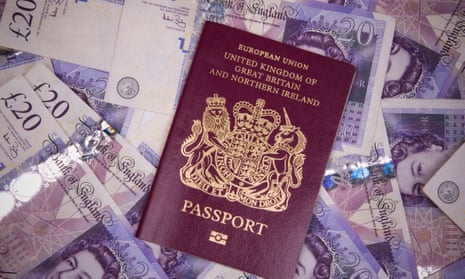






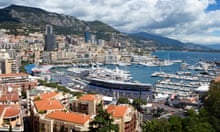



Comments (…)
Sign in or create your Guardian account to join the discussion